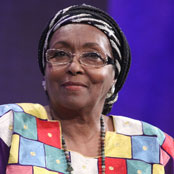 THE DAILY BEAST
THE DAILY BEAST
by Lynn Sherr
Saturday, March 13, 2010
 Edna Adan Ismail had wanted to build a hospital since she was 11 years old. Today, her facility in Hargeisa saves women's lives every day--and has reduced the maternal mortality rate by one-fourth.
Edna Adan Ismail had wanted to build a hospital since she was 11 years old. Today, her facility in Hargeisa saves women's lives every day--and has reduced the maternal mortality rate by one-fourth.
As an 11-year-old growing up in Somaliland, then a British protectorate, Edna Adan Ismail had a powerful dream. “I wanted to build a hospital,” she recalls. “One that my father would like.” Edna’s dad was a widely beloved but overworked doctor in a poorly equipped government hospital with little medicine, and she lent a hand when she could. “My playground was the hospital,” she says, “and my father was my hero. I’d cut up sheets for bandages, wash the forceps. I wished I knew more to be able to help him out.”
Hardly. Despite her own privileged circumstances, young Edna faced the same discrimination that kept the entire region’s women down: no schools for girls. “It wasn’t right to teach a girl,” she said, explaining the tradition. “They thought nothing good would come of it. Who would ever want to marry a girl who read and wrote?” So the child who was so taken with medicine–“I saw my first birth and my first death before I was a teen. I felt I’d been given a small peephole into what the world looked like”–was sent away to school, and ultimately became the first female in her country to win a scholarship to England. There she studied nursing and midwifery, and came back home in 1961 as the first qualified Somali nurse-midwife. That’s the first ever
Once again she had to confront centuries of bias against girls. "I would ask them to come help me register the patients, and I’d have to get permission from their fathers. They’d say, ‘I don’t want my girl to work in a hospital and catch diseases.’ Or, ‘Will she be working with men?’” Slowly, Ismail prevailed.
Even as her life expanded into the public realm – her husband became Somaliland’s prime minister–she continued to work in another hospital, proudly donning her uniform to teach and to deliver babies. “I was teaching the young women how to talk to patients, to pregnant women, to respect human rights and dignity.”
 Revolution interrupted her work, and she spent several decades with the United Nations. By the time she returned to Somaliland in 1997 and started building the hospital, she was so well respected, she joined the new government, ultimately becoming Foreign Minister. Today, she says with confidence, “I am my own minister.” But she continues to work for her people, training, in addition to nurse-midwives, lab technicians and the first pharmacists in her country. “The government isn’t doing it,” she tells me. “The biggest gift I want to leave behind is not a building, but the skills I leave with the women. I want to train 1,000 midwives.”
Revolution interrupted her work, and she spent several decades with the United Nations. By the time she returned to Somaliland in 1997 and started building the hospital, she was so well respected, she joined the new government, ultimately becoming Foreign Minister. Today, she says with confidence, “I am my own minister.” But she continues to work for her people, training, in addition to nurse-midwives, lab technicians and the first pharmacists in her country. “The government isn’t doing it,” she tells me. “The biggest gift I want to leave behind is not a building, but the skills I leave with the women. I want to train 1,000 midwives.”
Her progress so far is astounding. Since the hospital opened, they have delivered more than 9,500 women and lost only 39. “That’s 39 too many,” she laments, nonetheless delighted that they have reduced the maternal mortality rate by one-fourth. In 1988, the last time a study was done, there were 160 deaths per 10,000 births in Somaliland, making it the third worst in the world. “Women are dying of complications nobody is picking up,” she explains. “Because nobody is there to support them, care for them, or deliver them. They are getting infected, torn apart. No woman should die of childbirth, because modern obstetrics has ways to save them.” The challenge: “ignorance, poverty, and harmful traditions.”
Those are also the culprits in her other lifelong cause: ending the practice now called Female Genital Mutilation. When she started speaking out–to the embarrassment of her husband–it was simply Female Circumcision. “No one would talk about it then. I was the first Somali woman to pick up a microphone.” And despite all the publicity in recent years she says, “We have not cracked the surface of it. I am giving out a document at the conference showing a new survey of 4.000 women. Of them, 97 percent, shamefully, had been cut. After 34 years of campaigning. We’re nowhere near winning that battle.”
But Edna Adan Ismail takes comfort that now, “we have the whole world talking about it, it’s out of the closet.” And she’s working on a new project, a picture book in the Somali language to illustrate the pros and cons (with emphasis on the cons) of the practice.
“It will be one more gun that we haven’t used before,” she announces with confidence.
Crazy old lady, indeed.
Lynn Sherr is a former ABC News correspondent, author of Failure Is Impossible: Susan B. Anthony in Her Own Words and Tall Blondes, a book about giraffes. She is also co-editor of Peter Jennings: A Reporter's Life. Her most recent book, a memoir—Outside the Box: My Unscripted Life of Love, Loss and Television News—is out in paperback.